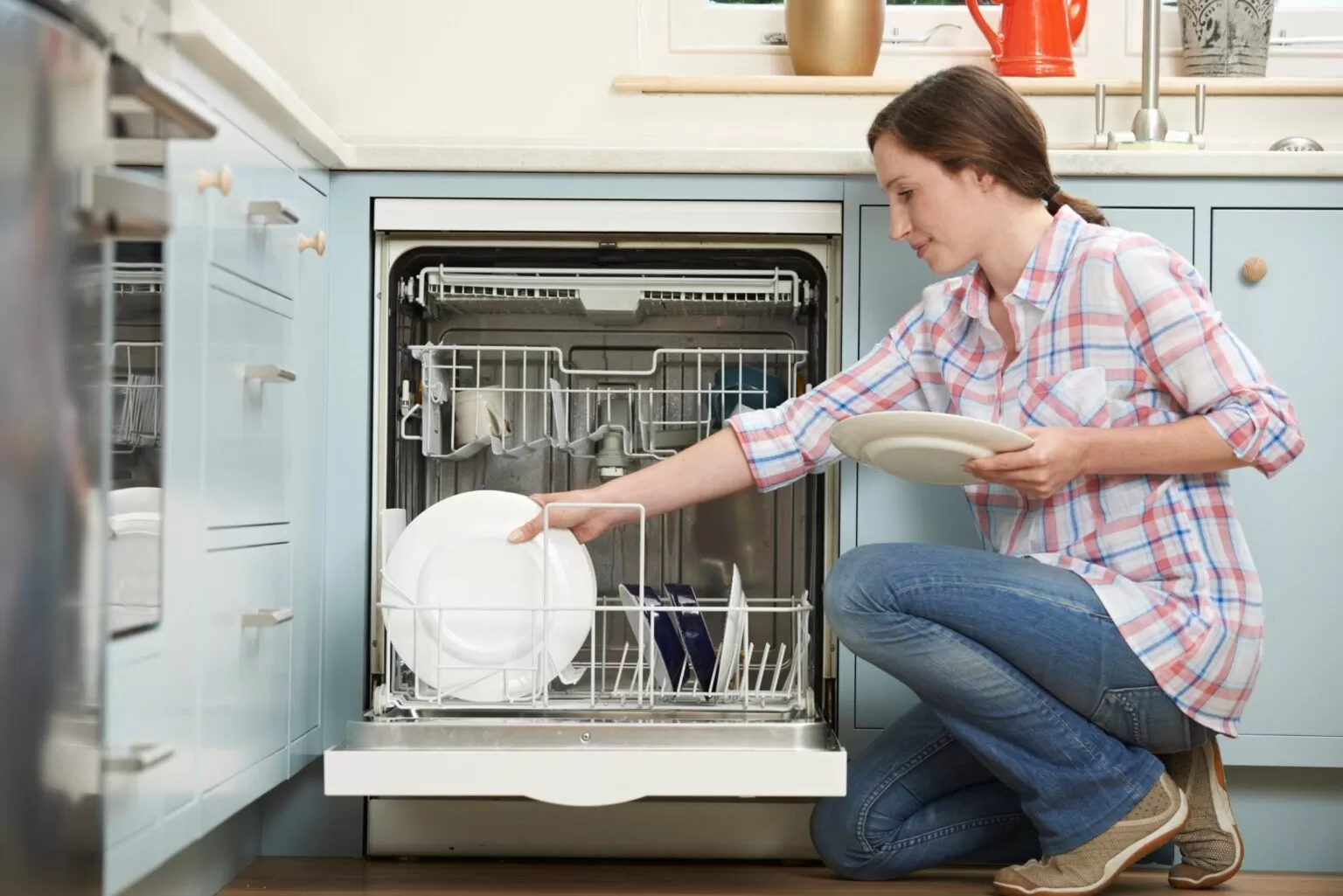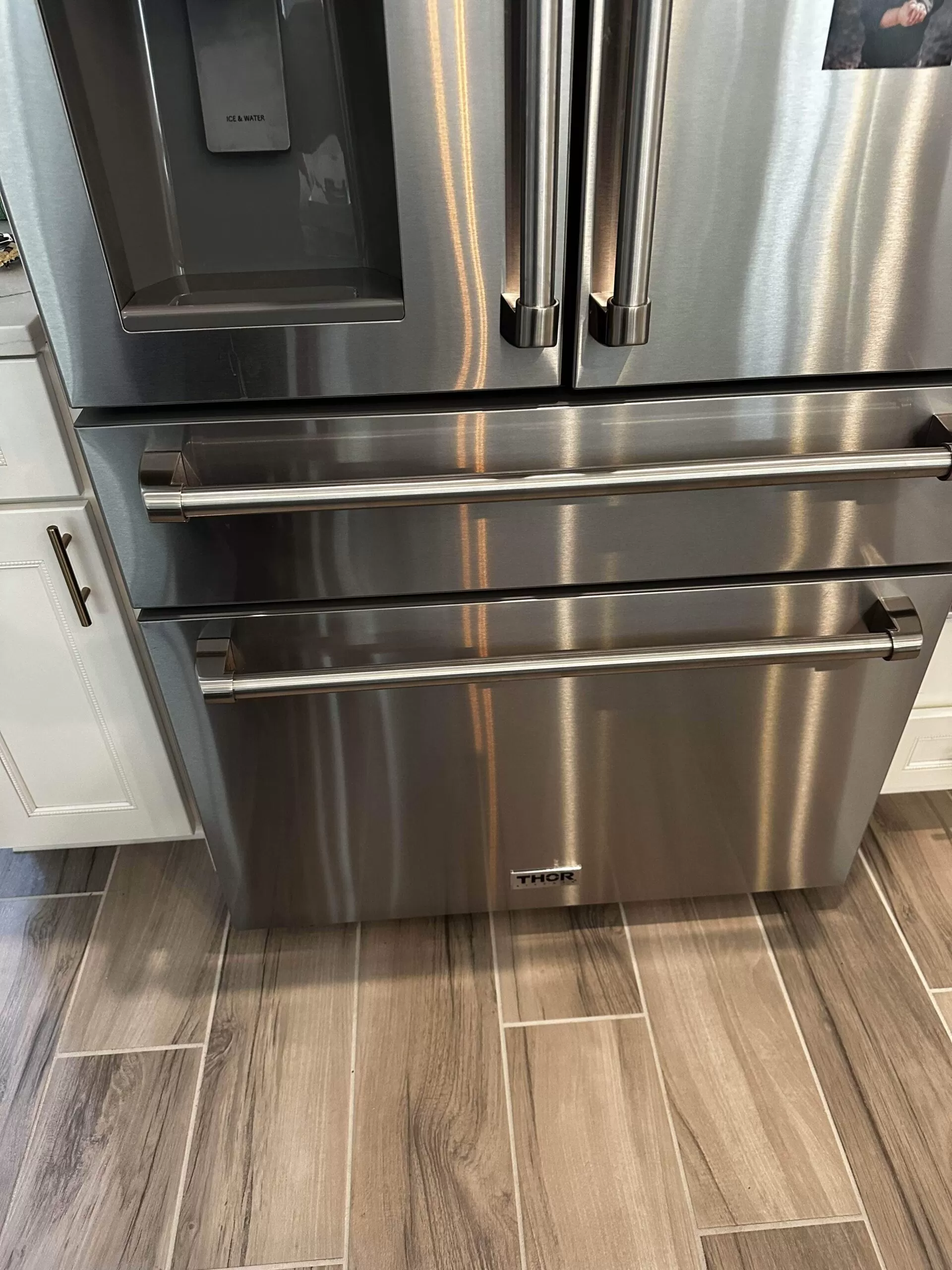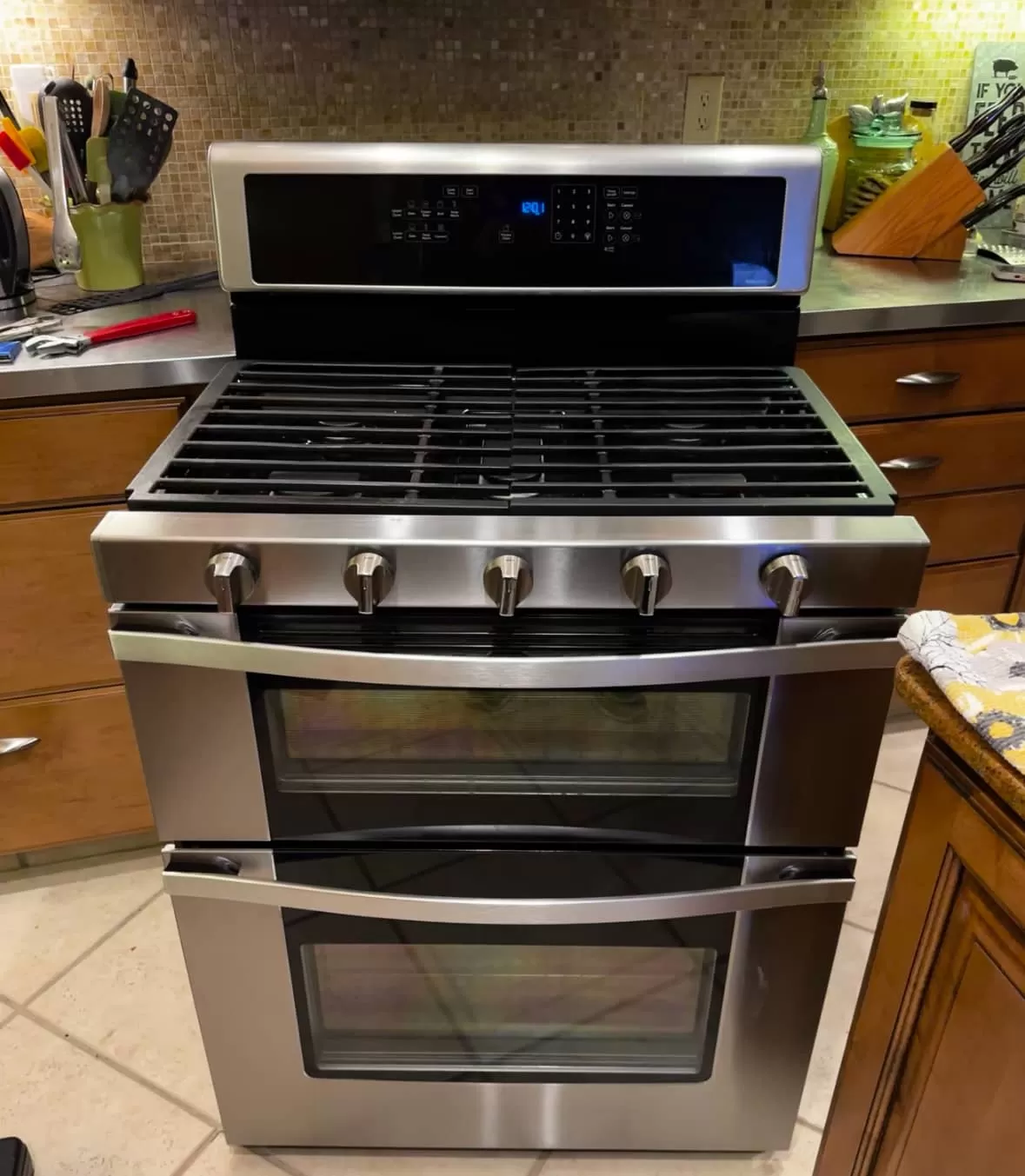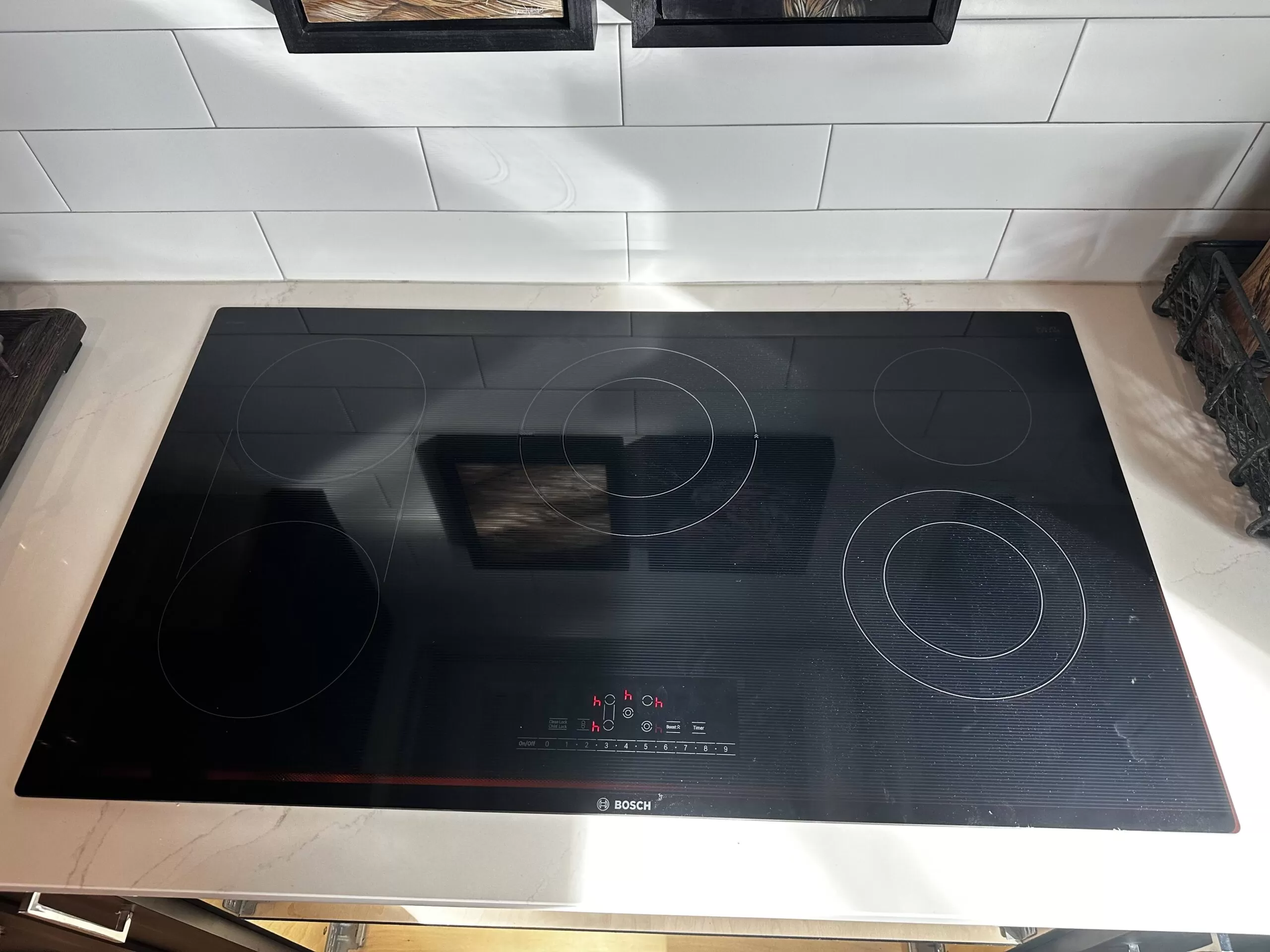When a household appliance breaks down, it can throw your entire routine into chaos. Whether it’s a dishwasher that won’t drain, a refrigerator that’s stopped cooling, or a washing machine that’s gone silent, appliance failures are frustrating. This leaves homeowners wondering: should I repair it or is it time to replace it?
Making the right decision between repairing or replacing an appliance can be tricky. With so many factors to consider, like cost, age, and energy efficiency, a rushed decision could lead to unnecessary expenses – either through costly repairs that don’t last or by purchasing a new appliance that might not be the best fit.
In this article, we’ll walk you through the key considerations to help you decide. By the end, you’ll have a clearer understanding of whether repairing or replacing your malfunctioning appliance is the best option, saving you both time and money.
Assess the Condition of Your Appliance

Before making a decision, it’s essential to assess the overall condition of your appliance. Here are the most important aspects to evaluate:
Age of the Appliance: The age of your appliance plays a major role in deciding whether to repair or replace it. Most appliances have a lifespan of 10-15 years. If your appliance is older, parts may become harder to find, and the cost of repairs can increase. Replacing it with a newer, more energy-efficient model might make sense, especially when factoring in potential savings on energy bills.
Frequency of Breakdowns: Has your appliance been reliable in the past, or has it needed frequent repairs? If you’re constantly calling for repairs, it could indicate that the appliance is near the end of its life. Frequent breakdowns are often a sign that it’s time to replace the appliance. If it’s been repaired multiple times in the last few years, the costs of continued repairs may outweigh the price of purchasing a new one.
Energy Efficiency: Older appliances consume much more energy than newer models, leading to higher utility bills. If you’ve noticed a spike in your energy costs, your appliance might be the culprit. Replacing an old refrigerator, dishwasher, or washing machine with a newer, more energy-efficient model could result in significant savings on your utility bills over time.
Condition of Core Components: When essential components like the motor, circuit boards, or compressors are failing, repairing the appliance can become expensive. If these major parts are damaged, the repair cost could be as high as or even exceed the cost of a new appliance. If the appliance has significant wear on its core components, replacement might be a more cost-effective option in the long run.
Repair Costs vs. Replacement Costs

One of the most important factors when deciding to repair or replace your appliance is the cost. Understanding the cost of repairing vs. replacing can help you make an informed decision.
Cost of Repair: Some repairs are relatively inexpensive. For example, fixing a clogged dishwasher drain or replacing a refrigerator thermostat may not cost much. However, more complex repairs, like fixing a broken compressor or motor, can be expensive. In some cases, repair costs can approach or exceed the price of a brand-new appliance.
Labor Costs: Don’t forget to factor in labor costs when evaluating repair expenses. Appliance repair technicians charge for their time, and labor costs can vary depending on the complexity of the repair and where you live. For major repairs, like replacing a motor or compressor, labor charges can add up quickly, making the repair more costly than a replacement.
Warranty Considerations: If your appliance is still under warranty, it might make sense to repair it instead of replacing it. New appliances typically come with a warranty that covers parts and labor for a specific period (usually 1-5 years). Repairs on older appliances may not be covered by a warranty, and you’ll be responsible for both parts and labor costs. If your appliance is out of warranty and the repair is expensive, it may be worth considering a replacement.
Consider the Long-Term Costs
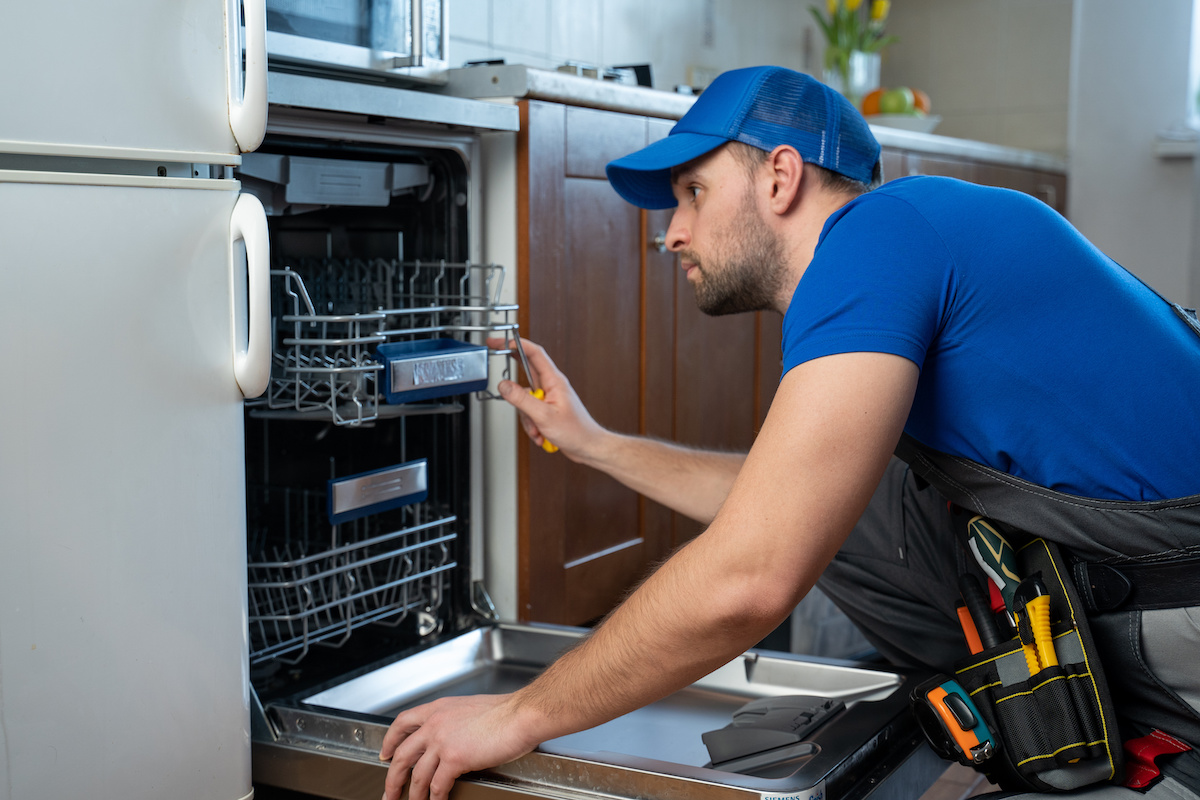
When deciding between repair vs. replacement, consider not just the immediate costs, but the long-term savings and expenses.
Energy Efficiency: New appliances are designed to be much more energy-efficient than older models. Upgrading to a modern energy-efficient appliance could save you hundreds of dollars a year in utility bills. For example, a new refrigerator uses far less electricity than an older model. Over time, this can make a significant difference in your monthly energy expenses.
Longevity: A new appliance typically has a longer lifespan than an older one. While your current appliance may be reaching the end of its useful life, a replacement will likely last 10-15 years or more with proper maintenance. In contrast, older appliances often require frequent repairs, which can add up over time.
Future Repair Costs: Even if the current repair seems relatively inexpensive, it’s crucial to think about future costs. If you’ve already spent money on several repairs in the past few years, the appliance may soon require more costly fixes. A new appliance eliminates the need for frequent repairs and offers peace of mind knowing that it’s under warranty.
Repair Time vs. Replacement Time
Repair Time: In many cases, appliance repairs can be completed quickly, especially if the issue is minor. A technician may be able to fix a simple issue like a faulty seal or clogged drain in just a few hours. If your appliance is essential to your daily life, a quick repair could get it up and running without much delay.
However, more complex repairs, such as replacing a motor or control board, may require more time, potentially leaving you without your appliance for longer. If you need an appliance back in service quickly, a same-day repair might be your best bet.
Replacement Time: Replacing an appliance often takes longer than repairing one. Not only do you need to purchase the new appliance, but you also need to account for delivery and installation times. Depending on the model, delivery can take anywhere from a few days to a few weeks. If you need a replacement immediately, the wait time could be a factor in your decision.
Pros and Cons of Repairing vs. Replacing
When considering whether to repair or replace, weigh the pros and cons of each option:
Pros of Repairing
- Generally Cheaper: Repairs are often more affordable, especially for minor issues.
- Keep Your Current Model: If you’re happy with the current appliance, repairing it allows you to avoid adjusting to a new model.
- Fewer Environmental Impacts: Repairing an appliance extends its life, reducing landfill waste.
Cons of Repairing
- Repairs May Not Last: Old appliances may break down again, leading to more repairs.
- Parts May Be Harder to Find: As appliances age, replacement parts can become difficult to locate or expensive.
Pros of Replacing
- New Features and Energy Efficiency: Modern appliances come with better features and consume less energy, which can save money over time.
- Warranties: New appliances typically come with a warranty, which covers repairs for a specified period.
- Longer Lifespan: A new appliance will likely last longer than an older one.
Cons of Replacing
- Higher Initial Cost: New appliances require a larger upfront investment.
- Adjustment to New Model: You may need to get used to a new appliance, which can be frustrating if you’ve grown accustomed to your old one.
When deciding between repairing or replacing your appliance, consider the appliance’s age, condition, repair costs, and potential energy savings. If repairs are expensive or the appliance is nearing the end of its lifespan, replacement might be the more cost-effective choice in the long term. However, if your appliance is relatively new and the repair cost is reasonable, a repair might extend its life without the need for a major investment.
For expert advice, consult with a professional technician who can help assess the situation and guide you toward the best solution. At [Your Company Name], we offer reliable appliance repair services using high-quality, original parts. With same-day service and a warranty on all repairs, you can trust us to get your appliance back in working order quickly and effectively.
If you’re unsure whether to repair or replace your appliance, schedule a free diagnostic consultation with our experts today. We’ll assess the condition of your appliance and recommend the most cost-effective solution. Plus, with same-day service and a warranty on all repairs, you can rest easy knowing you’re in good hands.
When Should You Repair Your Appliance?
Deciding whether to repair or replace an appliance can be tricky. While replacement is often seen as the solution when an appliance is malfunctioning, there are cases where repair is not only more cost-effective but also practical. Let’s explore some key scenarios where repairing your appliance can be the better option:
When the Appliance Is Still Relatively New and Has Years of Service Left
If your appliance is still within its expected lifespan and has been well-maintained, repairing it can be a smart choice. Most appliances last anywhere between 10 to 15 years, depending on the type and how well they’ve been cared for. If your appliance is just a few years old and still running efficiently, repairing it can extend its life and save you from spending a significant amount on a replacement.
For instance, if a refrigerator or dishwasher experiences a minor malfunction like a faulty water valve or a broken seal, a repair can restore the appliance to good working order for several more years, and it will likely cost much less than replacing it with a new one.
When the Repair Cost Is Reasonable and Parts Are Available
Repairing an appliance is often the best option when the repair costs are relatively low and replacement parts are still available. If the problem is minor (such as a washing machine that isn’t draining correctly) and the necessary parts are easily accessible, repair can be an affordable solution. Replacing the appliance in this case could be a waste of money, especially when a quick fix restores the appliance’s functionality.
Before proceeding with the repair, it’s important to confirm that the parts you need are still in circulation. Older appliances can sometimes be difficult to repair because of a lack of parts, making replacement the more practical solution in those instances.
When the Issue Isn’t Critical and Doesn’t Affect Safety or Core Functionality
If the issue with your appliance doesn’t affect its core functions or overall safety, a repair can be worth considering. For example, if a microwave’s turntable isn’t spinning, but the microwave still heats food properly, repairing the minor cosmetic issue may be worthwhile. On the other hand, if the issue affects something more serious like the appliance’s cooling system or safety features, it’s likely time to replace the appliance.
For example, if a stove isn’t heating evenly, but it’s still working enough to cook, it might be worth repairing. But if there’s a gas leak or electrical malfunction, replacing the appliance becomes the safest and more cost-effective option.
When Should You Replace Your Appliance?
There are certain situations where replacing an appliance is a more practical and economical decision. Here are some key scenarios when it might be better to replace your appliance rather than repair it:
When the Repair Cost Exceeds or Approaches the Cost of a New Appliance
If the repair costs approach or exceed the price of a new appliance, replacement is often the better option. Major repairs such as replacing a compressor in a refrigerator or a motor in a washing machine can be quite costly and may make up a significant portion of the price of a new model.
A common rule of thumb is that if the repair cost is 50% or more of the cost of a new appliance, it’s usually a better investment to buy a new one. New appliances come with warranties, modern features, and improved energy efficiency, all of which contribute to long-term savings.
When the Appliance Is Old and Inefficient
Older appliances, especially those nearing or beyond their typical lifespan, tend to lose their efficiency over time. Even if the appliance is still functional, its performance may decline, leading to higher energy bills.
For example, an old refrigerator may still cool, but it could consume far more electricity than newer, energy-efficient models, which can result in significantly higher utility costs. Replacing such an appliance might have a higher initial cost, but the energy savings will often offset the expense over time.
When Newer Models Offer Significant Upgrades
Sometimes, replacing an appliance is the best option if newer models offer major improvements in terms of energy efficiency, functionality, or safety features.
For instance, a modern dishwasher may use much less water and electricity compared to an older model. New stoves and ovens often come with advanced safety features like automatic shut-off, and updated designs are generally safer, more efficient, and more intuitive to use. Smart appliances are also becoming increasingly popular, offering remote control and monitoring through apps.
If your current appliance is lacking these features or if it’s inefficient, upgrading could be a worthwhile investment for the long term.
Expert Tips for Making the Right Decision
When it comes to deciding whether to repair or replace your appliance, here are some expert tips to help you make the most informed and cost-effective choice:
Consider Repair vs. Replacement Based on Total Cost, Lifespan, and Condition
Take a step back and evaluate the overall condition of your appliance before making a decision. Key factors include:
- Repair Cost: If the repair cost is approaching or exceeds the price of a new appliance, replacing it may be the better option.
- Lifespan: If your appliance is relatively new and still has many years of service left, repairing it might make more sense. But if it’s nearing the end of its lifespan (usually around 10-15 years), repairs might only be a temporary solution.
- Condition: Does your appliance still operate efficiently, or is it prone to frequent breakdowns? If the appliance has had several repairs in the past few years, you might be throwing money down the drain by continuing to fix it.
Consult a Professional Technician
If you’re unsure whether to repair or replace your appliance, getting an expert opinion is always a good idea. A professional technician can assess the problem and help you understand whether it’s a minor issue that can be fixed or a sign of a deeper, more costly problem. An expert can also provide insight into the overall condition of your appliance, its expected remaining lifespan, and the potential repair costs.
Check Your Warranty and Service Options
Before making a decision, review any warranties or service agreements for your appliance. Many appliances come with manufacturer’s warranties (typically lasting 1-5 years), and some repair companies offer guarantees on their work. If your appliance is still under warranty, repairs may be covered, which could save you a significant amount of money.
If you’re purchasing a new appliance, don’t forget to ask about the warranty coverage and whether you can extend it. Warranties can offer valuable protection for the first few years, giving you peace of mind that you won’t be stuck with unexpected repair bills.
Weighing Your Options
Deciding whether to repair or replace an appliance requires careful thought. Factors like the age of the appliance, repair costs, energy efficiency, and safety concerns all play a role in your decision.
- Repair is typically the best option if the appliance is still relatively new, the repair is affordable, and it doesn’t compromise the appliance’s core functionality or safety.
- Replacement may be necessary if the repair cost is high, the appliance is old and inefficient, or if a new model offers better features, improved energy efficiency, and enhanced safety.
By considering these factors, you can make an informed decision that saves you both time and money. And remember, consulting with a professional technician can provide you with valuable insight to help guide your decision.
Contact GDoing for Expert Appliance Repairs
At GDoing, we provide same-day appliance repair services with a focus on quality and customer satisfaction. Our technicians use only high-quality, original parts to ensure that your appliance is as good as new. Whether you need a minor repair or a more complex fix, our experts are here to help.
Schedule a free diagnostic consultation today and let us assess your appliance’s condition. With our warranty on all repairs and professional service, you can trust us to find the best solution for your needs. Contact us now to get started!
